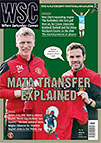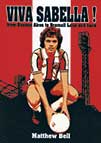
Search: 'transfers'
Stories
 The rise and fall of Carson Yeung
The rise and fall of Carson Yeung
by Daniel Ivery & Will Giles
GHI HK Ltd, £20
Reviewed by Chris Sanderson
From WSC 339 May 2015
English football’s wholehearted embrace of the free market has meant that the sense of place and identity that clubs once provided their fans is increasingly meaningless to owners and administrators. Of course, the game here has always been dominated by a handful of wealthy clubs and provided a platform for the likes of Bob Lord, Robert Maxwell, Doug Ellis et al to use clubs as their personal playthings. But as the history of English football since 1992 has been one of untold riches and a wholehearted embrace of laissez-faire economics, so it has likewise seen a wholesale loosening of the links between the clubs and their communities. And as fans of teams as diverse as Leeds, Portsmouth and Coventry can testify, their acquisition by owners who have little regard for their club’s history or supporters has rarely been positive.
Haircuts & League Cups tells the cautionary tale of how Carson Yeung, a former Hong Kong hair stylist who made a personal fortune through gambling and stock market speculation, came to purchase the heroically underachieving Birmingham City.
As the sum Yeung’s consortium paid – a frankly ridiculous £81.5 million – was hardly questioned at the time, so the book is less a narrative of one man’s ownership of a club but more an exposé of the willingness of the football authorities, media and initially Blues fans themselves to wilfully ignore his financial shortcomings. Meticulously written by Daniel Ivery, whose excellent Often Partisan website is regularly the sole source of reliable and verifiable information on the club, and Hong Kong solicitor Will Giles, the story throws light on the murky nature of football finances and the profound effect that decisions made thousands of miles away can have on fans.
Yeung aside, the book includes a cast of pantomime villains that range from Birmingham’s previous owners (Davids Gold and Sullivan), the Premier and Football Leagues and above all Yeung’s acolyte Peter Pannu. Indeed since publication, this litigious former Hong Kong policeman has posted a series of offensive, rambling posts on Often Partisan, that may well be the catalyst for the change in ownership that Blues fans so desperately desire.
When sentenced to six years in prison for money laundering, Yeung was described as someone who was “prepared to, and did, lie whenever he felt the need to”. It is to Ivery’s credit that his single-handed and determined work has unravelled his story and produced a factual document that exposes not just the current plight of Birmingham City but the shortcomings of English football more generally. As Ivery and Giles say: “The Football League will not even talk to the media about how they police the game, preferring to hide behind soundbites. Football has become a honeypot for investors looking for a quick buck. Add in the additional element of international transfers which involve numerous unregulated intermediaries, then you can easily understand why it is attractive to money launderers.” It’s a cautionary tale of which fans of all clubs should be mindful.
 A new owner usually brings promises of lavish spending but Charlton fans need only look at examples in Belgium to see how their club will be run, says John Chapman
A new owner usually brings promises of lavish spending but Charlton fans need only look at examples in Belgium to see how their club will be run, says John Chapman
At the end of last season, thousands of football fans marched through the streets of Liège protesting about the president of the city’s major football club. The anger of fans, who forced their way into the stadium and interrupted a board meeting, was aimed at Roland Duchâtelet, the new owner of Charlton Athletic.
 From Buenos Aires to Bramall Lane and back
From Buenos Aires to Bramall Lane and back
by Matthew Bell
ACM Retro, £12.95
Reviewed by Sam Kelly
From WSC 315 May 2013
Today, Alejandro Sabella wears an Argentinian FA baseball cap to work, and is probably the international football manager most people would like to take under their arm and cuddle. He wasn’t always a softly spoken, grandfather-like figure, though. In 1978, he was part of a transfer saga which transformed British football. Sabella’s move from River Plate, where he was a fringe player, to Sheffield United is less well known than those of Ricardo Villa and Osvaldo Ardiles to Tottenham Hotspur (from Racing and Huracán, respectively). Viva Sabella! tells the story of how Sheffield United manager Harry Haslam brokered the Spurs deals, while making sure to return from his post-World Cup trip to Argentina with a player of his own.
The book goes into rather more detail about the 1978 World Cup than it really needs to, as it does with Estudiantes de La Plata’s Copa Libertadores and Intercontinental Cup triumphs in the late 1960s (Sabella managed Estudiantes later in life, winning the Libertadores himself in 2009, but wasn’t connected to them at that time). Not all of the Argentinian sections are quite on song – the stadium in which the author claims Estudiantes played home matches in the late 1960s wasn’t opened until 2003 – and on a couple of occasions he attributes derisive interpretations to Argentinian nicknames for teams or people which are in fact meant fondly.
Unfortunately, we can only guess as to why Haslam was happy to let Tottenham in on the Ardiles and Villa deals with seemingly nothing to gain for himself – clearly football in the late 1970s was a different world. Antonio Rattín, who had a fixer’s role in the transfers, is remembered exclusively in Britain for his red card against England during the 1966 World Cup. That makes it interesting to see him portrayed as the pleasant and charming gentleman he has a well-earned reputation for being in Argentina.
There are cameos from Carlos Bilardo, Don Revie and Juan Sebastián Verón among others and a good summary of Sabella’s playing time in England; he impressed on a personal level but his team-mates didn’t hit the same heights for Sheffield United and the club were relegated to Division Three in his first season. He then had a brief spell at Leeds United before returning to Argentina, where he played a few matches for the national team. Sabella’s life on his return home is well treated, especially his coaching and managerial career as assistant to Daniel Passarella at River Plate, Argentina and Uruguay, and his step up to the number-one spot first with Estudiantes and then as manager of Argentina.
Although Sabella’s name is in the title, and his face looks out from the cover, this isn’t really a book about him – it is more to do with the difficulties players can run into when moving to a new country and culture. It also as a testament to Harry Haslam, a man whose vision of the direction football was going in proved correct, even if it didn’t benefit his club.
 After a decade in the top flight Bolton seem destined for relegation, but Owen Coyle’s team are capable of conjuring up an unlikely belief and beating anyone on their day, argues Jon Callow
After a decade in the top flight Bolton seem destined for relegation, but Owen Coyle’s team are capable of conjuring up an unlikely belief and beating anyone on their day, argues Jon Callow
In August 2001, the Liverpool goalkeeper Sander Westerveld brought his career at the club to an early close with a late blunder that sent newly promoted Bolton Wanderers to the top of the table just three games into their current Premier League stint. Establishing themselves in the top division after years of ups and downs, Bolton became a tricky fixture for their distinguished guests. Liverpool collected just five points from their next five visits
to the Reebok.